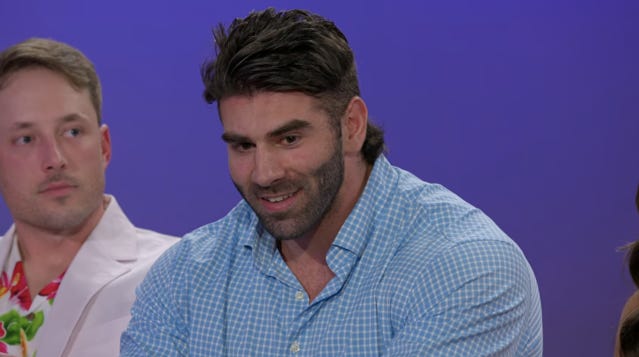This season of Love is Blind is over, but before I put my PhD in armchair psychology back in the box, let’s talk about the reunion. It didn’t fully deliver – not enough of the right questions were asked and it mostly felt like a campaign to keep the show on the air in the wake of its recent controversies. There was a lot of focus on the show’s past marriages as if to say, “see, this thing really works!” Debatable, certainly, but I can’t fault them for trying to convince us otherwise.
To me, the most interesting part of the reunion was the conduct of Trevor and Clay, the season’s two toxic kings. In my writing on the show (you can read my past essays on LIB here and here), I focused on the disintegrating relationship between the woefully ill-matched Chelsea and Jimmy, who in a surprise to no one but Chelsea, don’t end up getting married. Trevor, Chelsea’s mulleted almost-boo, was mentioned only in relation to Chelsea curving him for Jimmy. But since then, he’s become a villain in the court of public opinion when it was revealed that he had a girlfriend throughout filming who he reconciled with immediately after leaving production. (At present, it seems that they’re no longer together.)
In texts that were read aloud by Nick Lachey doing his best disappointed teacher impression, Trevor expresses his love for this woman (who was totally comfortable with him going on a show where he could reasonably end up married within a month…?) and tells her that he’s going to marry her upon leaving the pods. When asked why he’d come on the show while entangled in such a messy situation, Trevor is shockingly unprepared for the grilling. He’s at a genuine loss for words until he eventually finds his voice, repeating that he and his ex were toxic to each other, both recognized the need to change, and that he was on the show to truly find love. He claims that he was heartbroken by Chelsea’s decision, and Johnny, the season’s resident good guy, corroborates this, which is supposed to make us believe him. So yeah, a lot going on here.

On the other hand, we have Clay, a former All American athlete who, at one point in the reunion, suggests that his commitment issues partially stem from the “rockstar lifestyle” that college sports entails (he’s like, thirty now…but okay!). He spends the whole season telling his fiancée AD that he's afraid of cheating on her the way his father cheated on his mother throughout their marriage, even revealing that his father used to take him on trips to see his mistress under the guise of father-son bonding. As far as we see on screen, they never really discuss the impact this trauma has had on Clay, his view on the role of a husband, and his ability to connect with women, and ultimately he rejects AD at the altar following her “I do.” It’s honestly gruesome to witness – AD’s young nieces watching her break down is particularly upsetting. Clay says that the experience of the show led him to therapy, and he’s better now, apparently having unpacked all his lifelong trauma in the year since they filmed, just in time to reap the rewards of a social media career. Convenient!

What struck me about Trevor and Clay is the similarity in their stories and behavior. Here are two men who seem legitimately distraught at being shitty – though not so distraught that they’re willing to stop sacrificing women in the name of their personal self growth, but that’s another essay. They’re upset at their behavior and feel compelled to become different, better – they just don’t want to put in the effort to do so. They’re both expecting some huge flashpoint moment where everything changes, some external experience that jolts them into being better men. It’s clear from their comments about why they elected to participate in this experience that that’s what they expected the show to give them. The bizarre circumstances (alongside meeting the “right” woman, of course) were supposed to be the magic wand that gave them their emotional makeover so they could jet ski off into the sunset as good people. I’ve worked in reality TV before, so I’ll concede that producers can be quite powerful — but they ain’t that powerful.
I suspect that Hollywood movie magic is partly to blame for this mindset. I think many of us are searching for our inciting incidents – the pivotal moment that sets the main character into motion at the beginning of the movie, the thing that will force us to make all the changes we need to before it’s “over for you hoes.” But while the inciting incident is external, what actually gives a story its momentum is the lock in – how the protagonist responds to this intrusion to their status quo. In other words, what really gets a story going is the main character’s choice – and the choices they make throughout, ultimately resulting in lasting changes in their character before they come out the other side, usually better for it. In a story, we call this a character arc. In life, I believe this is what the kids call a “healing journey.”
There’s a reason that this journey – reckoning with your past, dealing with whatever’s holding you back, and finally detaching so you can move on to a healthier future– is also often called “doing the work.” The shit is work. It’s simple, though it’s not easy: if you want to be better, you actually have to be better. (Imagine that!) This is a lot harder than a magic snap of the fingers. It means consistent, dedicated effort over time. It means repeatedly showing up as the new self even when old habits threaten to resurrect from the grave. It means coming to terms with the fact that there’s no deus ex machina accompanied by weird goblets and a camera crew that makes everything better, the way Trevor and Clay seem to think there is. We make a choice to change and continue to make that choice day in and day out. There’s no switch to flip. There’s just the work.
This sucks, obviously. If it didn’t, so many of us wouldn’t be searching for shortcuts. But if you’ve been reading Brain Rot for a while, by now you know that the corny stuff is often true, and this is no different. Unfortunately, the only way out is through – that is, getting better incrementally, choosing the harder but more fulfilling path every day until it becomes the only path, as far as we’re concerned. I know; I’m exhausted just thinking about it. But ultimately it’s a reminder that every day is another opportunity – to move forward, to hold steady where we are, or to start again. And again. And again, until it sticks. And we get to do it all in the privacy of our own homes, camera-free, and without a $50,000 penalty from the Netflix overlords hanging over our heads. Now that’s something to be grateful for!
See you next week,
Lola xx




